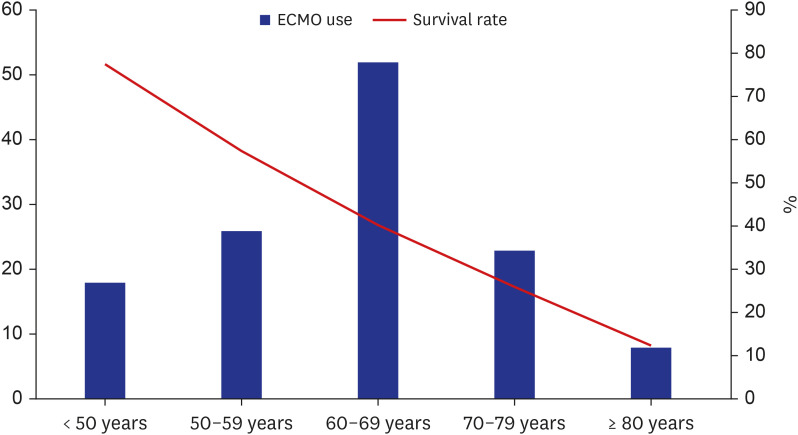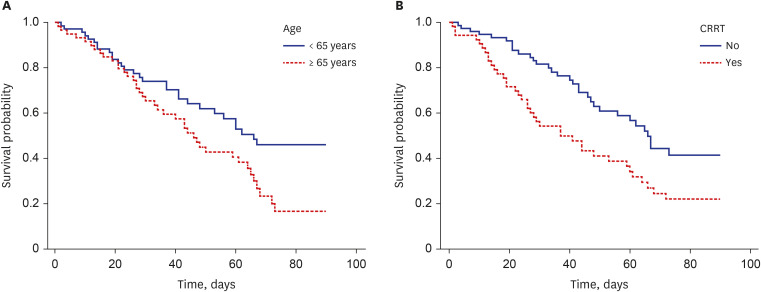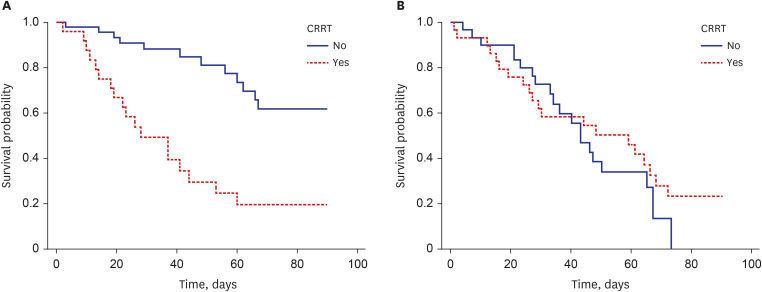J Korean Med Sci.
2024 Mar;39(8):e75. 10.3346/jkms.2024.39.e75.
Risk Factors for the Mortality of Patients With Coronavirus Disease 2019 Requiring Extracorporeal Membrane Oxygenation in a Non-Centralized Setting: A Nationwide Study
- Affiliations
-
- 1Department of Internal Medicine, Chung-Ang University Hospital, Chung-Ang University College of Medicine, Seoul, Korea
- 2Division of Pulmonary, Allergy and Critical Care Medicine, Hallym University Sacred Heart Hospital, Anyang, Korea
- 3Division of Pulmonology and Critical Care Medicine, Department of Internal Medicine, Severance Hospital, Yonsei University College of Medicine, Seoul, Korea
- 4BioMedical Research Institute for Convergence of Biomedical Science and Technology, Pusan National University Yangsan Hospital, Yangsan, Korea
- 5Division of Allergy, Pulmonary, and Critical Care Medicine, Department of Internal Medicine, Transplant Research Center, Research Institute for Convergence of Biomedical Science and Technology, Pusan National University Yangsan Hospital, Yangsan, Korea
- 6Department of Internal Medicine, Pusan National University School of Medicine, Busan, Korea
- 7Department of Pulmonary and Critical Care Medicine, Asan Medical Center, University of Ulsan College of Medicine, Seoul, Korea
- 8Division of Pulmonary and Critical Care Medicine, Department of Internal Medicine, Seoul National University Hospital, Seoul National University College of Medicine, Seoul, Korea
- 9Department of Critical Care Medicine, Samsung Medical Center, Sungkyunkwan University School of Medicine, Seoul, Korea
- 10Division of Pulmonary and Critical Care Medicine, Department of Internal Medicine, Seoul St. Mary’s Hospital, College of Medicine, The Catholic University of Korea, Seoul, Korea
- 11Division of Critical Care Medicine, Department of Hospital Medicine, Inha Collage of Medicine, Incheon, Korea
- 12Department of Internal Medicine, Division of Pulmonary and Critical Care Medicine, Seoul National University Bundang Hospital, Seongnam, Korea
- 13Division of Allergy and Pulmonary Medicine, Department of Internal Medicine, Soonchunhyang University Bucheon Hospital, Bucheon, Korea
- 14Department of Internal Medicine, Gyeongsang National University Hospital, Jinju, Korea
- 15Department of Internal Medicine, Gyeongsang National University Changwon Hospital, Gyeongsang National University School of Medicine, Changwon, Korea
- 16Division of Pulmonology and Allergy, Department of Internal Medicine, College of Medicine, Yeungnam University and Regional Center for Respiratory Diseases, Yeungnam University Medical Center, Daegu, Korea
- 17Division of Pulmonology and Critical Care Medicine, Wonkwang University Hospital, Iksan, Korea
- 18Division of Pulmonary, and Critical Care Medicine, Department of Internal Medicine, Chonnam National University Hospital, Gwangju, Korea
- 19Department of Pulmonology and Critical Care Medicine, Chosun University Hospital, Gwangju, Korea
- 20Division of Pulmonary and Critical Care Medicine, Department of Internal Medicine, Chungnam National University College of Medicine, Chungnam National University Hospital, Daejeon, Korea
- 21Department of Internal Medicine, Chungnam National University College of Medicine, Chungnam National University Sejong Hospital, Sejong, Korea
- KMID: 2553326
- DOI: http://doi.org/10.3346/jkms.2024.39.e75
Abstract
- Background
Limited data are available on the mortality rates of patients receiving extracorporeal membrane oxygenation (ECMO) support for coronavirus disease 2019 (COVID-19). We aimed to analyze the relationship between COVID-19 and clinical outcomes for patients receiving ECMO.
Methods
We retrospectively investigated patients with COVID-19 pneumonia requiring ECMO in 19 hospitals across Korea from January 1, 2020 to August 31, 2021. The primary outcome was the 90-day mortality after ECMO initiation. We performed multivariate analysis using a logistic regression model to estimate the odds ratio (OR) of 90-day mortality. Survival differences were analyzed using the Kaplan–Meier (KM) method.
Results
Of 127 patients with COVID-19 pneumonia who received ECMO, 70 patients (55.1%) died within 90 days of ECMO initiation. The median age was 64 years, and 63% of patients were male. The incidence of ECMO was increased with age but was decreased after 70 years of age. However, the survival rate was decreased linearly with age. In multivariate analysis, age (OR, 1.048; 95% confidence interval [CI], 1.010–1.089; P = 0.014) and receipt of continuous renal replacement therapy (CRRT) (OR, 3.069; 95% CI, 1.312–7.180; P = 0.010) were significantly associated with an increased risk of 90-day mortality. KM curves showed significant differences in survival between groups according to age (65 years) (log-rank P = 0.021) and receipt of CRRT (log-rank P = 0.004).
Conclusion
Older age and receipt of CRRT were associated with higher mortality rates among patients with COVID-19 who received ECMO.
Keyword
Figure
Reference
-
1. World Health Organization. WHO coronavirus (COVID-19) dashboard. Updated 2023. Accessed August 22, 2023. https://covid19.who.int/ .2. Tzotzos SJ, Fischer B, Fischer H, Zeitlinger M. Incidence of ARDS and outcomes in hospitalized patients with COVID-19: a global literature survey. Crit Care. 2020; 24(1):516. PMID: 32825837.3. Lobo SM, Creutzfeldt CJ, Maia IS, Town JA, Amorim E, Kross EK, et al. Perceptions of critical care shortages, resource use, and provider well-being during the COVID-19 pandemic: a survey of 1,985 health care providers in Brazil. Chest. 2022; 161(6):1526–1542. PMID: 35150658.4. Wise J. Covid-19: WHO declares end of global health emergency. BMJ. 2023; 381:1041. PMID: 37160309.5. Telenti A, Arvin A, Corey L, Corti D, Diamond MS, García-Sastre A, et al. After the pandemic: perspectives on the future trajectory of COVID-19. Nature. 2021; 596(7873):495–504. PMID: 34237771.6. Combes A, Schmidt M, Hodgson CL, Fan E, Ferguson ND, Fraser JF, et al. Extracorporeal life support for adults with acute respiratory distress syndrome. Intensive Care Med. 2020; 46(12):2464–2476. PMID: 33140180.7. Evans L, Rhodes A, Alhazzani W, Antonelli M, Coopersmith CM, French C, et al. Surviving sepsis campaign: international guidelines for management of sepsis and septic shock 2021. Intensive Care Med. 2021; 47(11):1181–1247. PMID: 34599691.8. Badulak J, Antonini MV, Stead CM, Shekerdemian L, Raman L, Paden ML, et al. Extracorporeal membrane oxygenation for COVID-19: updated 2021 guidelines from the Extracorporeal Life Support Organization. ASAIO J. 2021; 67(5):485–495. PMID: 33657573.9. Peek GJ, Mugford M, Tiruvoipati R, Wilson A, Allen E, Thalanany MM, et al. Efficacy and economic assessment of conventional ventilatory support versus extracorporeal membrane oxygenation for severe adult respiratory failure (CESAR): a multicentre randomised controlled trial. Lancet. 2009; 374(9698):1351–1363. PMID: 19762075.10. Combes A, Hajage D, Capellier G, Demoule A, Lavoué S, Guervilly C, et al. Extracorporeal membrane oxygenation for severe acute respiratory distress syndrome. N Engl J Med. 2018; 378(21):1965–1975. PMID: 29791822.11. Baek MS, Lee SM, Chung CR, Cho WH, Cho YJ, Park S, et al. Improvement in the survival rates of extracorporeal membrane oxygenation-supported respiratory failure patients: a multicenter retrospective study in Korean patients. Crit Care. 2019; 23(1):1. PMID: 30606235.12. Makhoul M, Keizman E, Carmi U, Galante O, Ilgiyaev E, Matan M, et al. Outcomes of extracorporeal membrane oxygenation (ECMO) for COVID-19 patients: a multi-institutional analysis. Vaccines (Basel). 2023; 11(1):108. PMID: 36679953.13. Barbaro RP, Odetola FO, Kidwell KM, Paden ML, Bartlett RH, Davis MM, et al. Association of hospital-level volume of extracorporeal membrane oxygenation cases and mortality. Analysis of the extracorporeal life support organization registry. Am J Respir Crit Care Med. 2015; 191(8):894–901. PMID: 25695688.14. Nishikimi M, Ohshimo S, Hamaguchi J, Fujizuka K, Hagiwara Y, Anzai T, et al. High versus low positive end-expiratory pressure setting in patients receiving veno-venous extracorporeal membrane oxygenation support for severe acute respiratory distress syndrome: study protocol for the multicentre, randomised ExPress SAVER Trial. BMJ Open. 2023; 13(10):e072680.15. Ramanathan K, Shekar K, Ling RR, Barbaro RP, Wong SN, Tan CS, et al. Extracorporeal membrane oxygenation for COVID-19: a systematic review and meta-analysis. Crit Care. 2021; 25(1):211. PMID: 34127027.16. Ling RR, Ramanathan K, Sim JJ, Wong SN, Chen Y, Amin F, et al. Evolving outcomes of extracorporeal membrane oxygenation during the first 2 years of the COVID-19 pandemic: a systematic review and meta-analysis. Crit Care. 2022; 26(1):147. PMID: 35606884.17. Chong WH, Saha BK, Medarov BI. Clinical characteristics between survivors and nonsurvivors of COVID-19 patients requiring extracorporeal membrane oxygenation (ECMO) support: a systematic review and meta-analysis. J Intensive Care Med. 2022; 37(3):304–318. PMID: 34636697.18. Tran A, Fernando SM, Rochwerg B, Barbaro RP, Hodgson CL, Munshi L, et al. Prognostic factors associated with mortality among patients receiving venovenous extracorporeal membrane oxygenation for COVID-19: a systematic review and meta-analysis. Lancet Respir Med. 2023; 11(3):235–244. PMID: 36228638.19. Chong WH, Saha BK, Medarov BI. A systematic review and meta-analysis comparing the clinical characteristics and outcomes of COVID-19 and influenza patients on ECMO. Respir Investig. 2021; 59(6):748–756.20. Fanelli V, Giani M, Grasselli G, Mojoli F, Martucci G, Grazioli L, et al. Extracorporeal membrane oxygenation for COVID-19 and influenza H1N1 associated acute respiratory distress syndrome: a multicenter retrospective cohort study. Crit Care. 2022; 26(1):34. PMID: 35123562.21. Kurihara C, Manerikar A, Gao CA, Watanabe S, Kandula V, Klonis A, et al. Outcomes after extracorporeal membrane oxygenation support in COVID-19 and non-COVID-19 patients. Artif Organs. 2022; 46(4):688–696. PMID: 34694655.22. Ling RR, Ramanathan K, Poon WH, Tan CS, Brechot N, Brodie D, et al. Venoarterial extracorporeal membrane oxygenation as mechanical circulatory support in adult septic shock: a systematic review and meta-analysis with individual participant data meta-regression analysis. Crit Care. 2021; 25(1):246. PMID: 34261492.23. Oh TK, Cho HW, Song IA. Mortality trends after extracorporeal membrane oxygenation support: a Korean nationwide cohort. Artif Organs. 2022; 46(5):850–858. PMID: 35083743.24. Schmidt M, Langouet E, Hajage D, James SA, Chommeloux J, Bréchot N, et al. Evolving outcomes of extracorporeal membrane oxygenation support for severe COVID-19 ARDS in Sorbonne hospitals, Paris. Crit Care. 2021; 25(1):355. PMID: 34627350.25. Riera J, Alcántara S, Bonilla C, Fortuna P, Blandino Ortiz A, Vaz A, et al. Risk factors for mortality in patients with COVID-19 needing extracorporeal respiratory support. Eur Respir J. 2022; 59(2):2102463. PMID: 34824058.26. Lebreton G, Schmidt M, Ponnaiah M, Folliguet T, Para M, Guihaire J, et al. Extracorporeal membrane oxygenation network organisation and clinical outcomes during the COVID-19 pandemic in Greater Paris, France: a multicentre cohort study. Lancet Respir Med. 2021; 9(8):851–862. PMID: 33887246.27. Barbaro RP, MacLaren G, Boonstra PS, Combes A, Agerstrand C, Annich G, et al. Extracorporeal membrane oxygenation for COVID-19: evolving outcomes from the international Extracorporeal Life Support Organization Registry. Lancet. 2021; 398(10307):1230–1238. PMID: 34599878.28. Supady A, Taccone FS, Lepper PM, Ziegeler S, Staudacher DL. COVEC-Study Group. Survival after extracorporeal membrane oxygenation in severe COVID-19 ARDS: results from an international multicenter registry. Crit Care. 2021; 25(1):90. PMID: 33648538.29. Shaefi S, Brenner SK, Gupta S, O’Gara BP, Krajewski ML, Charytan DM, et al. Extracorporeal membrane oxygenation in patients with severe respiratory failure from COVID-19. Intensive Care Med. 2021; 47(2):208–221. PMID: 33528595.30. Schmidt M, Bailey M, Sheldrake J, Hodgson C, Aubron C, Rycus PT, et al. Predicting survival after extracorporeal membrane oxygenation for severe acute respiratory failure. The Respiratory Extracorporeal Membrane Oxygenation Survival Prediction (RESP) score. Am J Respir Crit Care Med. 2014; 189(11):1374–1382. PMID: 24693864.31. Joshi H, Flanagan M, Subramanian R, Drouin M. Respiratory ECMO Survival Prediction (RESP) score for COVID-19 patients treated with ECMO. ASAIO J. 2022; 68(4):486–491. PMID: 35239533.32. Shekar K, Badulak J, Peek G, Boeken U, Dalton HJ, Arora L, et al. Extracorporeal Life Support Organization Coronavirus Disease 2019 Interim Guidelines: a consensus document from an international group of interdisciplinary extracorporeal membrane oxygenation providers. ASAIO J. 2020; 66(7):707–721. PMID: 32604322.33. Supady A, Combes A, Barbaro RP, Camporota L, Diaz R, Fan E, et al. Respiratory indications for ECMO: focus on COVID-19. Intensive Care Med. 2022; 48(10):1326–1337. PMID: 35945343.34. Roberts SH, Goodwin ML, Bobba CM, Al-Qudsi O, Satyapriya SV, Tripathi RS, et al. Continuous renal replacement therapy and extracorporeal membrane oxygenation: implications in the COVID-19 era. Perfusion. 2023; 38(1):18–27. PMID: 34494489.35. Zhou P, Yang XL, Wang XG, Hu B, Zhang L, Zhang W, et al. A pneumonia outbreak associated with a new coronavirus of probable bat origin. Nature. 2020; 579(7798):270–273. PMID: 32015507.36. Tang L, Yin Z, Hu Y, Mei H. Controlling cytokine storm is vital in COVID-19. Front Immunol. 2020; 11:570993. PMID: 33329533.
- Full Text Links
- Actions
-
Cited
- CITED
-
- Close
- Share
- Similar articles
-
- Treatment of acute respiratory failure: extracorporeal membrane oxygenation
- Extracorporeal Membrane Oxygenation Treatment in Coronavirus Disease 2019: Two Cases
- Outcomes of patients with COVID-19 requiring extracorporeal membrane oxygenation and continuous renal replacement therapy in the United States
- A case of rescuing a patient with acute cardiovascular instability from sudden and massive intraoperative pulmonary thromboembolism by extracorporeal membrane oxygenation
- Cardiac arrest with pulmonary edema in a non-parturient after ergonovine administration recovered with extracorporeal membrane oxygenation: A case report




